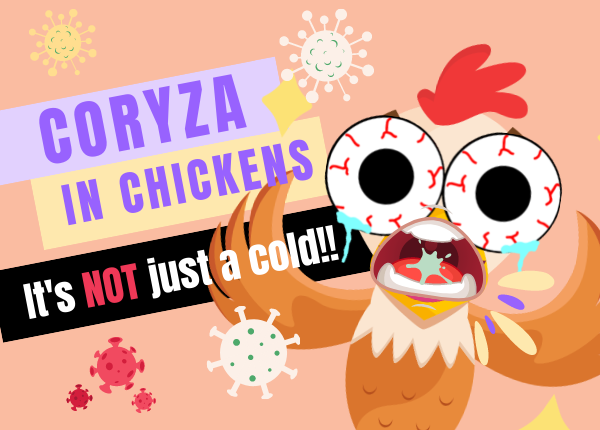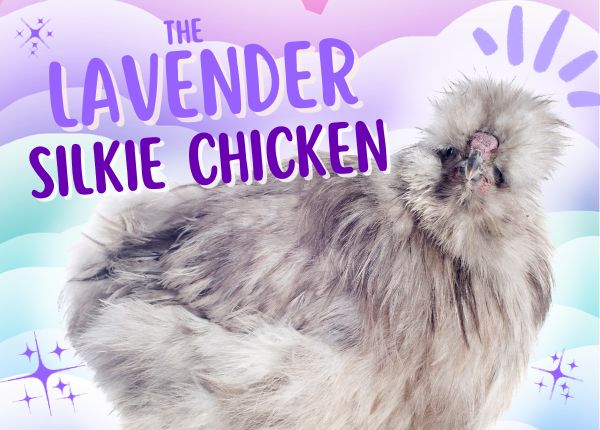
Coryza is essentially a nasty cold in chickens. Doesn’t sound too serious, does it?
Unfortunately, it is.
Infectious Coryza in chickens is on the up in the US, so you absolutely need to know about it!
Coryza is a highly contagious🦠 bacterial infection in chickens that spreads fast and is impossible for your flock to truly recover from.
It’s potentially fatal for weaker and older birds and can find distraught chicken keepers forced to cull their entire flocks.
Before I totally freak you out – this awful ailment is preventable - so stay put and I’ll cover how to spot the signs of this nasty bug, how to treat it, and how to prevent it in the first place.
Infectious Coryza causes extreme cold-like symptoms: inflammation of the face and wattles, snotty nostrils, gunky eyes, sneezing, breathing problems, reduced appetite, weight loss, and hindered egg production. It’s horrible. We’ve all been there!
Coryza rears its ugly heads in loads of species, including humans, but chickens seem to have drawn the short straw when it comes to mortality rates, with a tear-jerking 20% of chickens not pulling through.
I’m going to hold your hand through everything you need to know to do best by your birdy:
- What Is Coryza?
- Coryza symptoms
- How Is Coryza Spread?
- How Fast Does Coryza Spread in Chickens?
- Is My Chicken Healthy?
- Does My Chicken Have Coryza?
- What To Do If You Suspect Coryza
- Can People Catch Coryza?
- Can I Catch Coryza from my Chicken?
- Can I Eat My Chicken’s Eggs if They Have Coryza?
- Preventing Coryza in Chickens
- Coryza Vaccination for Chickens
- Treating Coryza in Chickens
- Can Chickens Recover from Coryza?
- Do I Need to Cull My Chickens with Coryza?
- Could My Chicken Get Coryza?
What Is Coryza?
Coryza is essentially a cold in chickens caused by the bacteria, Avibacterium paragallinarum. It’s a cattarhal infection of the upper respiratory tract which means that the bacteria cause inflammation of the mucus membranes, enlarged blood vessels, swollen tissues, and discharge.
The clinical syndrome was first diagnosed in 1931 by De Blieck and goes by a few different names including roup, catarrh, pip, and infectious coryza, or IC.
Whilst it’s not quite as catastrophic for your coop as something like Marek’s disease, it’s much worse than a human cold, causes poor growth in young chickens, a 10-40% reduction in egg laying, and fatalities in older or weaker birds.
Even when chickens recover from coryza, they always carry the pathogen, can never be introduced easily to new birds, require lifelong treatment, and are likely to relapse.
Coryza symptoms
Coryza in chickens looks like the common cold in every way.
The swelling of the sinus causes discharge from their eyes and nose known as lacrimation. This is basically a snotty beak and conjunctivitis. They’ll have very teary, gunky eyes which will eventually close completely.
The discharge from your chicken’s nose will be watery to begin with and then start to stink as their sinuses become infected with puss. Yuck.🤮
Blocked sinuses make it hard for your friend to breathe, and in turn, they’ll sneeze and cough frequently, which is why it spreads so fast.
Infected roosters - who, of course, have man-Coryza - may also show signs of inflamed wattles.

Coryza Symptoms include:
- Nose and eye discharge with a pungent smell
- Sneezing & coughing
- Swelling of the face, wattles, and eyes
- Difficulty breathing – open mouth
- Reduction in egg production
- Loss of appetite
- Weight loss
- Lethargy and difficulty walking
- Swollen head syndrome (less common)
We’re all guilty of catastrophizing when it comes to our chooks. Be careful not to overdiagnose your chicken!
Having a broad understanding of common health issues will avoid you connecting a single symptom with the first illness that comes to mind. You can’t research something if you don’t know it egg-sists!
If there is a rotten smell from the chicken’s mouth, and no eye or nose problems, then it may instead be a case of sour crop instead. Sour-what you say? Trust me when I say that you need to know!
Get all the tools you need to care for your chickens with Chickenpedia’s Chicken Health Course. Knowledge is king!
How Is Coryza Spread?

Coryza is airborne and passes directly from chicken to chicken by infected droplets of saliva, snot, or any other yuck they cough up. Poor things. The bacteria can then be ingested or inhaled through contaminated feed, water, bedding, or dust particles.
If you show your chickens (because they’re too gorgeous not to) just make sure you have your own space at the show and the area is well ventilated. Poultry shows and bird markets are hot spots for germs!
How Fast Does Coryza Spread in Chickens?
The incubation period for Coryza is just 1-3 days. You probably won’t spot any symptoms during these first few days, which is why you need to act fast when your chickens are symptomatic during the following 48 hours. Sadly, Coryza is always likely to have spread to the whole flock by the time you’ve spotted the signs, and all your birds are likely to be full of cold within ten days.
Is My Chicken Healthy?
Check out your chickens!
Chickenpedia have some brilliant charts and checklists to help you monitor your chicken’s routine growth and welfare, so you can spot changes in weight, behavior, appetite, or laying patterns pronto.
It’s easy to let day-to-day monitoring slip without a system, so I’d recommend looking at some of their easy-to-follow downloads like their chicken health charts. They are basically their to hold your hand, throughout your chicken keeping journey so you are never left feeling alone and worried.
“A healthy bird is alert and active, eating and drinking throughout the day with periods of dustbathing, sunbathing and resting in the afternoon” (Chickenpedia)
Here’s a great infographic to highlight all the signs of a healthy, happy, and hopefully just a little bit spoiled chicken.
Does My Chicken Have Coryza?
If your chicken is showing any of the coryza symptoms listed above, then they’re unwell in one way or another, so you’ll need to seek the support of your vet to diagnose what your chicken is suffering from.
What To Do If You Suspect Coryza

1. Isolate Your Sick Chick
You might think isolating your sick chick is pointless, if all your other chickens are likely to be sick soon too, bit it’s not. The first chickens to show symptoms will be weak and can be pecked at by other chickens, so in the case of coryza, isolation is to protect the sick chicken rather than your asymptomatic flock.
2. Treat The Entire Flock
The first thing to do is call your vet, who will test your chicken and prescribe the right antibiotic. You’ll need to declare your entire flock to get the right quantity of medication and guidance on how to treat every bird.
“If you cannot get your chicken to the vet immediately, be sure to isolate her from the rest of the flock until you can. Keep her in a warm, dry place and giving her food, water, and a little apple cider vinegar.” (Chickenpedia)
3. Tell Your Neighbors
This can feel like the walk of shame as you shuffle up the sidewalk ready to ruin your neighbor’s day, but it’s really important to spread the word so that you can stem the spread. They’ll want to treat their chickens too.
4. Avoid Cross-Contamination
If you are in contact with a friends’ flock, then you’ll need to postpone those coffee visits for a while! The bacteria can be carried on your shoes or clothing, so even washing your hands thoroughly isn’t cautious enough if you want to avoid any further heartache.
Can People Catch Coryza?
In humans, coryza is the cause of the common cold. It’s highly contagious, very common, there are lots of strains out there, and whilst it’s horrid to have, it’s not dangerous. In chickens, coryza can be fatal.
Can I Catch Coryza from my Chicken?
You can’t catch your chicken’s cold. These pesky poultry pathogens are not zoonotic: they don’t spread from one species to another. The common cold strain that’s affecting your chickens is not the same one that you suffer miserably with a couple of times a year. You’re all good!
Can I Eat My Chicken’s Eggs if They Have Coryza?
The eggs🥚 of a positive coryza bird are still safe to eat, just as long as they’re not currently on any antibiotics. You can even eat the meat of a chicken carrying coryza since the chicken strain of coryza is not harmful to humans.
Preventing Coryza in Chickens

Why, oh why would you want to see your feathery family suffer when they don’t have to?
You can minimize the risk of your cute little coop troop catching this deadly cold with these easy, affordable, no-brainer methods of prevention.
1. Practice Good Housekeeping
Coryza can be killed by heat, drying, and disinfectants. A thorough deep clean of your coop twice a year, and regular cleaning of feeders and waterers will reduce the risk of a fatal coryza infection.
2. Pay Attention to Biosecurity
I don’t mean recruit two bodyguards to stand either side of the nest box – I mean safeguarding your chickens from other animals, pathogens, and the general transfer of bacteria. Don’t walk from flock to flock without cleaning or changing your shoes and washing your hands as a minimal.
3. Manage Introductions of New Birds
Quarantine any new birds for a few weeks to make sure they don’t become symptomatic of coryza before introducing them to your flock and minimize contact with wild birds as best you can
I guess there is a bodyguard involved, really. You.
Coryza Vaccination for Chickens
The IC vaccination must be given, through the breast or thigh, at 18-16 weeks old. Hens also need a booster a month later to be as effective as possible during laying.
The vaccination will prevent the disease from manifesting, but chickens who contract coryza will still be carriers for life, so if you add to your chicken family, newbies will need vaccinating too.
There is a catch. The vaccine can cause some loss in production and – in some cases - mortality. With this risk factor playing on people’s minds, coryza vaccination is usually only preferred in geographical areas where the disease is most commonly found, or when an outbreak occurs somewhere nearby – always check with your local vet!
Treating Coryza in Chickens
Coryza can be treated, and symptoms can be managed, but the infection can never be eradicated.
I’d always say get straight to the vets, but if it’s not possible, some keepers treat early coryza symptoms with colloidal silver. It’s known to be antibacterial and can be syringe fed.
Get your poor poultry pal to the vet as soon as you can – I know you’ll be desperate to get them the help they need – and using the wrong over-the-counter antibiotics can inadvertently make things even worse for them.
Your vet will treat your sickly chick with the right antibiotics administered by injection, making them more powerful and more easily absorbed into the bloodstream. Antibiotics like erythromycin, streptomycin, or sulfonamides are most widely used.
You’ll need to treat the rest of your flock since they’re likely all carriers of coryza. Treating them early on will help them fight the bully-boy bug before it gets any worse.
There are other home remedies like grapeseed extract, apple cider vinegar, and garlic which can help ease the symptoms and make your chickens recovery less upsetting.Natural herbs like oregano, thyme, and grapefruit seed extract contain antioxidants and vitamins known to boost your immune system.
Can Chickens Recover from Coryza?
20% of infected chickens won’t survive Coryza. In older birds or weaker flocks, the mortality rate could be as high as 50%.
Chickens can recover but will always carry the bacteria. This means that if you introduce a new chicken to your seemingly healthy flock, it’s likely they’ll come down with this killer cold too.
Do I Need to Cull My Chickens with Coryza?
The heart-breaking fact about this evil illness is that you can treat and nurse your chickens to recovery, but you can never reverse the infection.
Recovered chickens will always carry the pathogen, meaning new chooks can’t be introduced to your coop, and excessive care will always be called for when traveling from flock to flock.
If you keep your chickens free-range and your neighbors have chickens, the risk to all neighboring flocks will never go away either.
The reality of the long-term impacts of coryza infections can force people into the soul-destroying decision to end the lives of all of their chickens, even after recovery. As the bacteria can live in the soil for years, you’ll need to wait at least six months before introducing new chickens to your home again.
Could My Chicken Get Coryza?
All chickens are sadly at risk of contracting Coryza, but some environmental and physiological factors that might increase the risk of infection for your chickens:
1. Location
Infectious Coryza is on the rise in the US. It’s most common in the Southwest but present pretty much everywhere.
2. Environment
Being an anaerobic bacillus (fancy chat for doesn’t need oxygen) it thrives in moist environments with little to no oxygen. Soil, water, and poop are perfect! Soil, water, and poop in a warm, damp, dirty coop are even better. Keeping your chicken mansion clean, dry, and well ventilated will dramatically reduce the spread of bacteria.
3. Previous Coryza Infection
Once a chicken has had Coryza, even if they recover symptomatically, they’ll always be a carrier. This means that they are susceptible to regressions if they are stressed or otherwise unwell.
4. Stress
Stressed chickens are more prone to illness in general, including coryza. Changes to their environment or new chickens in the flock can result in a lowered immune system.
5. Show Birds
Poultry shows are the riskiest places to take your chickens. Whilst it’s a great place to enjoy thousands of gorgeous chickens brought together to strut their sexy stuff, the bacteria and pathogens of planet poultry are strutting their stuff too…all over the place!
6. Cross-contamination
If you travel from flock to flock with work or caring for neighbor's birds etc, the risk of cross-contamination is higher.
7. General Health, Nutrition, & Wellbeing
A well-fed and nourished chicken will be stronger in every way and so able to fight off any illness faster and more efficiently than weaker or older birds. This is egg-sactly why mastering your chicken’s menu is so important!

Check out my blog on Chicken Nutrition, then test your skills with Chickenpedia’s Chicken Nutrition Course.
Think you’ll ace it? Let’s see!
Let’s face it. Keeping on top of chicken health and well-being…and behaviour…and nutrition, is not a one-stop job.
Have you heard of Infectious Bursal Disease, Avian Encephalomyelitis, Laryngotracheitis, and Avian Rhinotracheitis?
Would you recognize the early signs of these in your chickens?
Not yet, but I know someone who can teach you!
You can’t learn everything you need to know about livestock in a couple of blogs. Don’t get me wrong, it’s a very sensible start, and please do keep reading, but your chicken-knowledge-dipping will never end.
Chickenpedia have curated a chicken-keepers bible of all the things you need to know (and none of the nonsense you don’t) to raise healthy, happy chickens. They’ve created concise, easy-to-follow courses that you can dip in and out of when life allows, and when you need help most.











Leave a comment (all fields required)